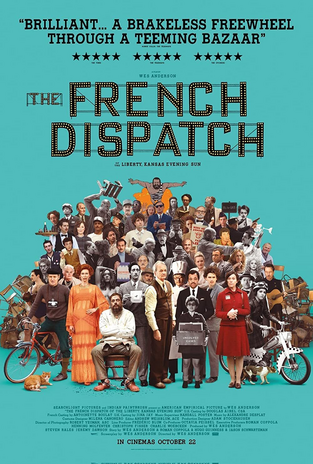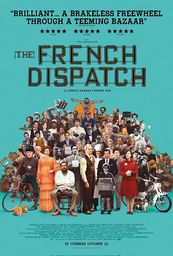It is hard to imagine a director with a more distinct style than Wes Anderson; his kitsch and colourful aesthetic is marked with a signature precision, brimming with playful characters and plots. ‘The French Dispatch’ is no different. It may even be the most Wes has ever Andersoned, even if it may not be the jewel in his cinematic crown as some make it out to be.
Whilst this is his first film in an anthology format, Anderson’s favourite players remain; set in the fictional French town of Ennui-sur-blasé, Bill Murray shines as editor-in-chief Arthur Howitzer Jr, fiercely protective of his tribe of scribes (including Frances McDormand, Owen Wilson and Jeffrey Wright) as they craft their three respective articles and produce a final edition in his honour. The film’s form mirrors its content; the episodic structure of this omnibus film reads like magazine, each article featuring a distinctly different story and setting to what precedes it. Punctuated with title pages and animated comic strips, the film’s form and style act as a love letter to a golden form of journalism, an intent so pure it is hard not be charmed.
Visually, the film sings and production designer Adam Stochausen is to be applauded for the scale of the film’s construction. The fantasy France in this film is steeped in history and poeticism, and each set allows the cinematography to sing. The signature symmetry of the film remains washed with vibrancy and other-worldly romanticism, as can be expected with Anderson. However, Anderson also allows himself to experiment with his style and form, using black and white film to mark a change in time or mood, as well as intertwining animation in a style unlike any of his previous work. There is also no faulting Anderson’s cast who bring the town of Ennui-sur-blasé to night. Timothée Chalamet and Frances McDormand are particularly exceptional as an unusual romantic pairing which could so easily feel uncomfortable and yet still manages to feel endearing. Failing that, Chalamet’s hair deserves an Oscar in itself.
Yet, at times this dedication to the film’s structure and style leaves the viewer seeking something missing. With no protagonist to ground the viewership amongst the topsy-turvy narratives, there is arguably too many elements to digest and develop. The cast and script are just so enormously vast that it feels that some of the moments lack the depth visible in much of his repertoire. Unlike previous works, in which a visual or textual thread acts as a constant which is laced into the seams of his intricate plots, the structural concept doesn’t feel like enough to hold the film together. There is no doubt that Anderson is a master of his craft; The French Dispatch remains a charming film filled with visual confectionary. Yet, I wonder if in this case, a pure commitment to an aesthetic leaves us unchanged.


